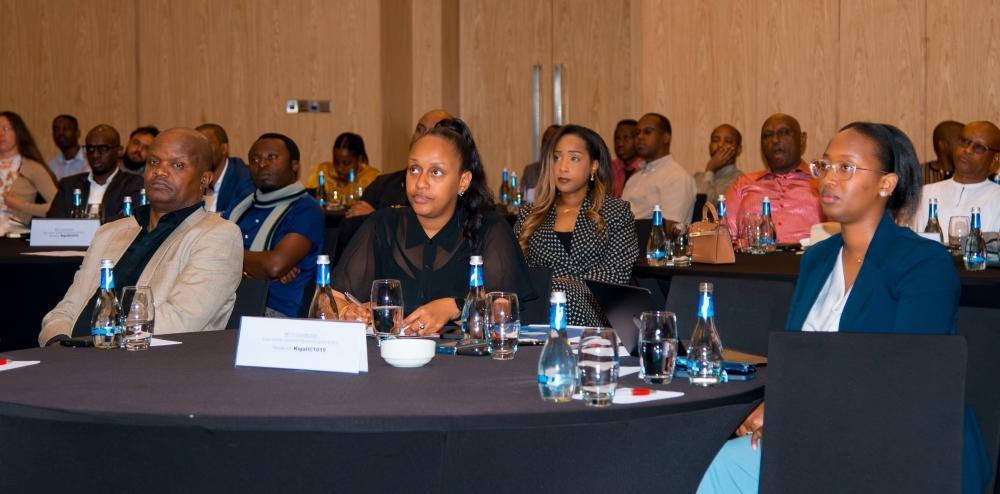Africa-Press – Rwanda. The Rwanda Development Board (RDB) is carrying out inspections in line with ensuring that entities in the hospitality industry have a Tourism Operating License and meet standards.
This was indicated on August 20, during a consultative meeting held by RDB and the Rwanda Tourism Chamber, with stakeholders in the tourism and hospitality sector.
The aim of the meeting was to raise awareness, foster collaboration, and promote compliance with tourism regulations to enhance service quality and operational standards across the industry, officials said.
Licensing requirements for hotels, restaurants, bars, nights clubs include occupational permits, valid trade license/business registration, drainage system, room designation (hotels only), safe deposit (hotels only), sewage disposal and treatment, water supply systems, security systems, proof of qualification/experience of management staff, and property and liability insurance, among others.
Rwanda Development Board CEO Jean-Guy Afrika interacts with hospitality stakeholders on the Tourism Operating License (TOL), during a meeting in Kigali on August 20.
RDB CEO Jean-Guy Afrika said that the tourism operating license is the central tool that “will allow our industry to maintain quality, protect consumers and compete at the highest level.”
Partnership between regulators, private operators, is what allows the delivery of a consistent experience every visitor or customer that chooses Rwanda, Afrika said.
“A guest who checks into a hotel, books a tour or enters a nightclub in Kigali is not just engaging with a private business. He is engaging with Rwanda,” he said.
“Their experience shapes their perception of our country and determines whether they return, become ambassadors when they leave, invest further or do the opposite, which I would prefer not to describe,” he said, stressing the need for regulation and standards.
Some industry players expressed concerns that the requirements for obtaining the licence are uniform for entities regardless of their size, calling for flexibility to address them.
Afrika said that the call for flexibility in requirements for the process of obtaining a tourism operating licence depending on the size of a hospitality entity will be considered.
He said that RDB aims to address inadequate enforcement of this regulatory measure.
“The objective we are aiming for here is to standardise the industry.The challenge we have is that we didn’t sufficiently enforce the TOL requirement and it has created a situation where you have some very good experiences, but on the other hand of the spectrum, you can have bad ones that create challenges in terms of safety, customer service, or hygiene.
“So, what we are trying to do is to come up with a minimum standard that upholds the industry,” he said.
Inspections and why they matter
RDB indicated that joint inspections began in April 2025, focusing initially on 4- and 5-star hotels. That followed a strategic meeting with member institutions.
So far, at least 47 hotels have been inspected in Kigali, 27 hotels in Musanze and Rubavu, and 6 in Karongi.
The meeting aimed to raise awareness, foster collaboration, and promote compliance with tourism regulations to enhance service quality and operational standards across the industry.
The next phase was expected to cover hotels in the Eastern and Southern provinces.
These inspections primarily check for compliance with national standards, hygiene protocols, and service quality assurance. They are a key part of enhancing service quality, hygiene, and compliance in the hospitality sector.
Currently, the inspections are carried out by a joint team composed of multiple institutions, including RDB, Rwanda Food and Drugs Authority (RFDA), City of Kigali, Smart Kigali Command Post, Rwanda Standards Board (RSB), Rwanda National Police (RNP), Rwanda Inspectorate, Competition and Consumer Protection Authority (RICA), Ministry of Health, Rwanda Information Society Authority (RISA), Rwanda Energy Group (REG), and Water And Sanitation Corporation (WASAC).
Each of these institutions plays a unique role, and when combined, they create a comprehensive and efficient inspection system, as well as ensure transparency, according to RDB. This joint approach also reduces the burden on business owners who would otherwise deal with multiple inspections from different institutions.
Industry players also raised challenges including the City of Kigali refusing to issue an occupancy permit when buildings are considered old and a hospitality entity being told to have a new building within a shorter deadline.
Germain Takubusoga from Akagera Business Group (ABG) raised a concern regarding the process of obtaining a tourism operating licence.
According to RDB, as one of the requirements, for a business to receive a tourism operating licence, it must first obtain a building occupancy permit from the City of Kigali (CoK), if it operates within the city.
For Akagera’s case, he said, they had acquired all the necessary documents for one of their businesses, but are currently stuck at the licensing stage. One major challenge is related to infrastructure regulations, he said. The law states that a licence cannot be issued if the building is considered old.
“When you try to refurbish it to a certain level, you do whatever so that it can be well-presented to attend the standard,” he said.
Effectively, this means that they will have to demolish the existing building and construct a new one from scratch to comply, something he says will take time.
He called for RDB’s support in engaging with the City of Kigali in the process for pertmit issuances for existing premises, even if on a provisional or conditional basis, while the operator works toward full compliance.
Solange Muhirwa, the chief of urban planning in the City of Kigali, said that for the issue of occupancy permit, there was a possibility to issue a temporary permit for hotels or restaurants to allow them to do business as long they comply with the minimum safety and security requirements.
For More News And Analysis About Rwanda Follow Africa-Press








